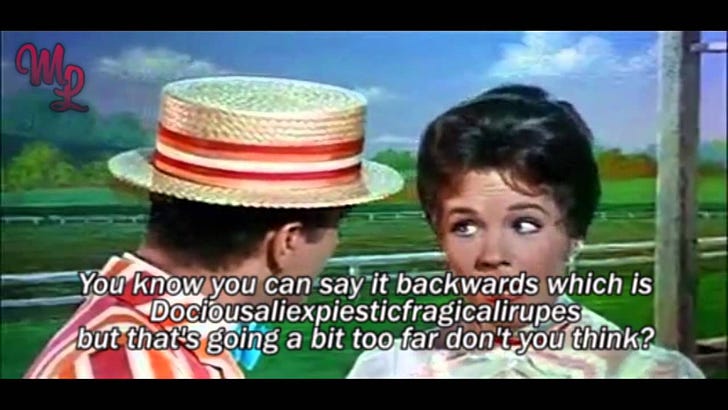One of the things I enjoyed the most as a young kid was to show people how smart I was.
This incredibly unattractive trait within me must surely have something to do with me being an only child. To the credit of my parents, they did a good job of instilling humility within me—it just took a while for those lessons to sink in.
In my quest to show off, memorizing long words was one impressive trick I saw other kids using, so I wanted to mimic this trick myself. 1964’s Mary Poppins was still incredibly popular by the early 80s, and so I learned supercalifragilisticexpialidocious, a made-up word Mary uses to describe an elated feeling after she wins a horse race. Yes, really.
Right there in the song, she hits the nail on the head: if you say it loud enough, you’ll always sound precocious. Now, I didn’t know that precocious was used to describe a kid had developed mental acuities earlier than usual, but I loved this incredibly long word. I wanted to memorize it, and so I practiced remembering the order of the syllables, saying them over and over again.
This was the longest word in the known universe! At least, it was the longest word in my universe at the time. The only problem was that it was a made-up word, a distinction I began to care about some time during elementary school. I needed a new longest word.
The Guinness Book of World Records provided me with my new best friend. I would often obsess over the Guinness Book, noting that the tallest person ever was just barely shy of 9 feet tall, people had fingernails that were dozens of feet long, and someone had once held their breath underwater for 13 minutes after hyperventilating (this record has since been broken).
The Guinness Book wasn’t just about personal feats, either. Among the superlatives was the longest word in the world “in common usage”: antidisestablishmentarianism.
Common usage, you say?
This common use word was introduced to me and nearly anyone who would get within earshot of me by the Guinness Book, and there was absolutely nothing common about the use of antidisestablishmentarianism.
There it was, though, and unlike supercalifragilisticexpialidocious, antidisestablishmentarianism was real!
I bet you can’t wait to use it in a sentence now, so let’s make some sense of the word. I like to start at the end of a word like this and work backwards, so we can make it more and more digestible as we go along.
We can lose the -ism suffix right away, since that really just means a belief or system. The next question to ask is: belief in what, exactly?
Well, in being an antidisestablishmentarian, obviously. What about that new suffix, -arian, though? Well, that just means someone who advocates for something… so our first two tricks aren’t really all that helpful in determining what the word really means.
Someone who believes in the system they practice studies -arianism, no matter what they study. Someone who practices antidisestablishmentarianism believes in the system of antidisestablishment.
Let’s cheat by going back to the beginning of the word now. Anti- simply means “against”, so we can say that this is someone who is against disestablishment. Yikes! Against disestablishment means you’re pro-establishment, and more specifically, you’re all about preventing disestablishment.
Establishments are things that have been built up over time. The physical manifestation might be a building like the Roman Coliseum or the Pyramids of Giza, but a more metaphorical interpretation gives us entrenched institutions.
So, there’s the whole thing: antidisestablishmentarianism is being against tearing down institutions. The word arose in response to the established church in Britain, the Church of England. Disestablishmentarians wanted to separate the Church of England from the state, believing there was no place for religion in government.
And, while the word was hardly in common use by the 1980s when I discovered this “longest word in common use”, it certainly was in 19th century England. The C of E never did officially separate from the state entirely, but the Church’s power has waned gradually ever since.
In an interesting twist, I no longer care much about memorizing big words. Don’t get me wrong—I respect the power and importance of naming things! Identifying specific ideas through language is amazing, but only because the language itself conveys a particular message.
However, the idea that keeping a series of syllables in my mind is somehow a good measure of my intelligence seems more silly with every passing year. I continue to gravitate more and more toward the character attribute of wisdom, and away from the sorts of intelligence that merely showcase storage capacity.
Do you remember learning a very long word as a kid? Do you still remember what that word was?





So if you're a follower of Antidisestablishmentarianism, you're basically pro-Empire. You're the Sith, essentially. Good to know!
Also, here's a 2-year-old video of me laughing at Nathan's attempts to say "supercalifragilisticexpialidocious"
https://photos.app.goo.gl/yqniorrZfQ4zLJnw9
Unlike you, I never turned humble and am now a horrible gloating parent instead.
In the 1970s, Isaac Hayes recorded a tune called "Hyperbolicsyllabicsesquedalymistic", which was based on an expression coined by his boss at Stax Records, Al Bell. I'm not sure exactly what it means (though I recognize terms related to "hyperbole", "syllable" and "sequence" in it), but he certainly made it sound funky, especially when his female backup singers sang the word out.